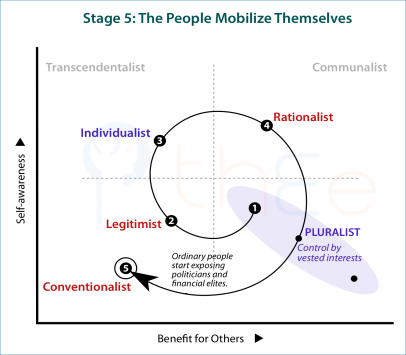Stage-5: Responsibility Starts in the Conventionalist Mode

The Big Shift
Cycle-1 was geared to issues, and the use of values and goals to determine societal choices. The transition to Cycle-2 deals with the context of choice. It is energized by ordinary people, for the first time, exposing political and financial elites with impunity.
The ruling class abuses, which contributed to the economic disaster that left them untouched, eventually becomes clear to all. These abuses can be classified into four types: deception, theft, oppression, unprofessionalism.
Drawn out distress likely as the economy implodes in slow motion invites the allocation of blame and fosters polarization.
Cycle-2 is therefore geared to providing the constraints on political classes needed to allow the battle over choices to continue while reducing future abuses of power. However, the path is not an easy one.
Deception: This usually permeates or accompanies items in other categories.
- Politicians lying to get approval or votes.
- Politicians lying to get or block a decision.
- Politicians cynically breaking electoral promises.
- Manipulation of statistics or destruction of documents.
- Secrecy primarily to avoid embarrassment or challenge.
- Gagging the press to protect politicians/bureaucrats.
Theft: A great deal of this is customary, expected or publicized as constructive.
- Transferring wealth from the poor to the rich via tax system, inflation, banking &c.
- Dishonest accounting for government finances.
- Accumulating excessive debt.
- Mismanaging projects leading to massive cost escalation.
- Pandering to vested interests via pork-barrelling, tax breaks, subsidies, bailouts &c. regardless of the public interest.
- Spending to protect political misbehavior or hide embarrassments.
Oppression:
- Politicians taking powers/rights that ordinary people do not have.
- Harassment of individuals or groups for political benefit, especially vindictive treatment of whistleblowers.
- Excessive complexity of bureaucratic rules, forms and procedures, so that it is impossible for citizens to know the law.
- Privacy invasions and unnecessary accumulation of personal data.
- Disregard for civil liberties: excessive powers of detention, rule by ministerial decree etc.
- Deliberate and excessive secrecy of government behaviors, reports, individual names.
- Governments entering wars regardless of public consent or engaging in war without calling it war.
- Treating the public as children who cannot understand, cannot be responsible, and cannot be trusted.
Unprofessionalism
- Political opponents are treated rudely or smeared deliberately.
- Politicians behaving immaturely e.g. not supporting rule of law for immediate pragmatic benefit.
- Lack of accountability by politicians and nameless bureaucrats.
- Politicians/bureaucrats who fail or break the law are rewarded.
- Cronyism, bribery and enmeshment with powerful interests.
- Politicians voting legislation but ignorant of its contents.
Abuses often fall into multiple categories, even all of them.
Mobilization will be a key feature in reaching this Stage and maintaining it. Its goal is the unequivocal and unambiguous expression of views about what is acceptable in political behaviour and a demand for a government that functions properly.
Since initially drafting this topic (2007), the predicted possibility of effective mobilization has been realized with the development of ultra-cheap networking technologies, especially using the mobile Internet. Proper use of technology minimizes the risks, unpleasantness and emotionality of physical mobilization (demonstrations) to express protest.
Mobilization can occur at any Stage in any society e.g. it is common preceding wars, and during election campaigns. Significantly, many promises made at election rallies are watered down or forgotten once the election is won.
Repressive authoritarian regimes may organize rallies, but they prohibit and forcibly disperse spontaneous rallies because of a fear of the people en masse. They block associations, prevent or tightly control protests, manage the media, interfere with Internet access, and monitor or exclude foreign journalists.
Under democratic regimes, campaigners and crusaders seek to mobilize people. This work may serve the public (e.g. improving car safety, warning of the dangers from smoking) but it has limited effects due to the influence of vested interests. In many cases (e.g. anti-war, animal rights, environmental protection) the public serves the cause (i.e. interests) of the activists, not the other way round.
Values & Institutions of the Conventionalist Mode
Commonality
Integrating Force:
Socio-political Institution:
Governance Requirement:
Individuality
Personal Benefit:
Social Interactions:
Provision of Knowledge:
Personal-Ethical Requirements
Core Value:
Civic Virtue:
- More on professionalizing politics.
-
Consider a viable strategy for shifting the balance of power.
OR
-
Continue to the political transition from the .
Originally posted: July 2009; Last updated: 11-Apr-2014
